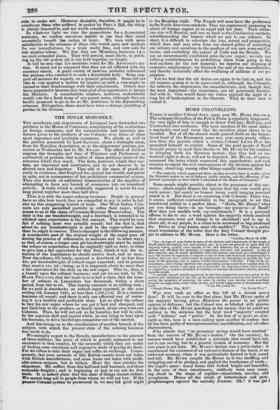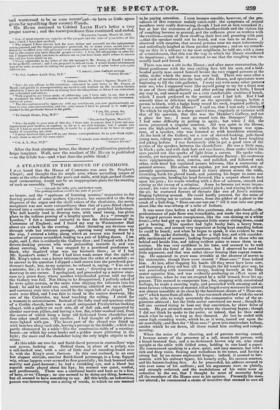MORE COLONELLING.
THERE is another Colonel down upon poor Mr. Hums this week. The unhappy Guardian of the Public Purse is regularly dragooned : the very sight of him is enough to throw Full-pay, Half-pay, and Unattached into confusion. The mere mention of his name makes a mustachio curl and twist like the sensitive plant about to he handled. But of all the absurd wrath poured forth on the bemar- tyred head of the Economist, none was ever more purely ridicu- kus than the passion which a certain Colonel LEITH HAY has permitted himself to exhibit. Some of the good people of Banff thought proper to send their thanks to Mr. HUME for his conduct in bringing forth his Sinecure motion : that they had an un- doubtedright to do so, will not be disputed. Mr. HUME, of course, answered the letter which expressed this approbation; and took occasion to regret the evil consequences of the division against his motion; observing, among other things equally innocent, that
" The majority which supported them on that occasion have in reality given the Ministers power to set at defiance public opinion, and the affirming so im- portant a principle as that which I submitted to the House of Commons."
Some people might possibly object to the grammar of this sen- tence; others might dispute the opinion that the vote would give such power; but surely no human being could imagine personal attack in it. But there is no reasoning with Colonels. There was, it seems, sufficient combustibility in the paragraph to set this touchwood soldier in a perfect blaze. " Hollo, Mr. Hume ! what are you doing there—in my borough—my preserve—of Banff? How dare you meddle with my constituents ? It is a personal offence to me to say a word against the majority which resolved that sinecures were not things to be abolished; and to say it, above all, to my people, is a crime to be answered or beg-pardoned for. Down on your knees, most vile meddler!" This is a pretty exact translation of the letter that the fiery Colonel thought pro- per to address to Mr. HUME. Here is the letter.
" London, March 16, 1833.
"Stn—A copy of your letter to some of the electors and inhabitants of the burgh of Banff: dated 4th instant. has just reached me : in it you are pleased to state that the majority voting against your motion of the 14th February has set at defiance public opinion, and affirmed the principle of supporting sinecures and pensions. As one of that majority, and of course identified with this censure conveyed to a constituency I have the honour to represent. I conceive it due to them and to myself unequivocally to declare that you bare endeavoured to misconstrue my intentions, to mystify the real state of the question, and to induce a belief inconsistent with fact. Under these cir- cumstances, and it being admitted that no pecuniary saving would hare resulted from the success of your motion. I call upon you to contradict the statement that I have assisted in supporting a system calculated to continue or increase the burdens already pressing upon the people. "I consider myself greatly aggrieved by the false impression you have given to the motives and intentions of my vote on the abovc•mentioned occasion, and trust to your seeing the propriety of removing the same by stating your having made assertions founded on supposition rather than on fact, and which supposition is inconsistent with truth. "I am, Sir, yours, Sm. "Joseph Hume, Esq., M.P." "A. LErrn HAL" Was ever such an affair as this left at a decent man's door ! It will be seen in the first place, that Mr. HUME spoke of the majority having given Ministers the power to set public opinion at defiance : but the Colonel was so blinded with passion at the idea of Mr. HUME poaching on his manor, that he could see nothing in the sentence but the fatal word "majority" coupled with "defiance" and "public." In the face of so gross an over- sight as this, here is a man calling upon another to confess that he has been guilty of misrepresentation, mystification, and all other abominations.
Who admits that " no pecuniary saving would have resulted" from the success of Mr. HUME'S motion ? On the contrary, its success would have established a principle, that would have led, not to one saving, but to a general system of economy. But the sore place is not here. Mr. HOME'S motion was a pulse-feeler : it ascertained the existence of an extensive disease of the heart, at an awkward moment, when it was particularly desired to look sound and full. Mr. HUME caught the House as it was shuffling and wriggling out of its pledges, and applied the touchstone of truth— the angel's spear: many forms that looked bright and beautiful, in the eyes of their constituents, suddenly were seen creep- ing about in the shape of reptiles—sinecurists, serviles, and sycophants. Hence all the wrath of letterwriters 'and para- graphmongers against the unlucky 3"0EPII. Oh! it was gal l After the first alarming letter, the threat of publication provokes huge laughter. Well, now the conduct of Mr. Hiram is published —in the Globe too—and what does the public think? 'and woritiwood to be so soon unniasiried—to have so little space
given or mystifying their country friends. •
Mr. HUME returned to •Colonel LEITM HAY's lefter a very proper answer ; and the eorreslionaence thus continued and ended. " Bryanston Square, March 16, 1833. SIR—T must express my suiprise at the purport and the tone a your letter of this date, which I haveiust received.
"The respect I have always had for your father and yourself, for the independent course pursued and the liberal principles professed, for so many years. would have in- duced we to afford you witli pleasure every explanation in my power ins friendly way ; but in the eottrse you have thought proper to take. I deny the allegations in your let- ter, I dispute the right you have to address me as you have done, and I refuse to answer the eall you have made on me. " Every expressiOn in my letter of' the 4th instant to Mr. Fraser, of Banff, I believe to be perfectly correct ; and I am prepared to defend them. I would furtherrecommend you to be more accurate in stating the purport of any letter of mine before you again address roe. "I remain, your obedient servant.
' To COI. Andrew Leith nay, MP." "JOSEPH HUME."
" 3, George Street, St. James's Square, March 17. " SIR—As yon adhere to the assertions contained in' Your letter to Mr. Fraser, of lialiff,and persist in misrepresenting my motives and eon-duet on the occasion therein alluded to. I have no hesitation in stating that the allegations, as fares I am concerned, are unfounded and untrue.
With regard-to my fature mode of addressing you. I have only to say that it will be regulated by what I consider due to myself, and little influenced by any recommen- -dation of yours. " You have endeavoured to injure mc with my constituents, you now pertinaciously ad. here to your misrepresentation, and the only course I have to pursue is to mrke your conduct in this particular known to the public.
" Bryanston Square. March 17. " Stu—In reply to your note of this day, I have only to repeat, that I have not mis- represented your motives or conduct, as far as I am able tojudge ; but I assure you that if I had so acted unintentionally, it would be a pleasure to me to have an oppor- tunity of correcting my error. "I never doubted that you will in any future correspondence do as you think right; I only claim to myself the same right. " I remain your obedient servant,
" JOSEPH HOME."
"Col. A. L. Hay, M.P." "1 am, Sir, yours,
" To Joseph Hume, Esq., M.P." "A. LEITH HAY."





















 Previous page
Previous page